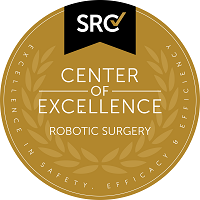BARIATRIC AND METABOLIC HEALTH CENTER
BARIATRIC SURGERY
Bariatric surgical procedures cause weight loss by restricting the amount of food the stomach can hold, causing malabsorption of nutrients, or by a combination of both gastric restriction and malabsorption. Bariatric procedures also often cause hormonal changes. Most weight loss surgeries today are performed using minimally invasive techniques and laparoscopic surgery.
Taking place in our private clinic located across from the main hospital campus, we offer the following bariatric surgery procedures:
- Gastric Bypass
Traditionally considered the gold standard of weight loss surgery, gastric bypass consists of two procedural components. First, a small stomach pouch is created by dividing the top of the stomach from the rest of the stomach. Next, the first portion of the small intestine is divided, and the bottom end of the divided small intestine is connected to the newly created stomach pouch.
The newly created stomach pouch is considerably smaller and facilitates significantly smaller meals, which translates into less calories consumed. The re-routing of the food stream produces changes in gut hormones that helps promote satiety, suppress hunger, and reverse Type 2 Diabetes.
Advantages:- Produces significant weight loss (usually 60-80% excess weight loss) *
- Restricts the amount of food that can be consumed
- May lead to conditions that increase energy expenditure
- Produces favorable changes in gut hormones that reduce appetite and enhance satiety. The hormonal changes can also help with sugar control and possible resolution of diabetes.
- Sleeve Gastrectomy
The laparoscopic sleeve gastrectomy is performed by removing approximately 80% of the stomach. The remaining stomach is a tubular pouch that holds a considerably smaller volume, reducing the amount of food that can be consumed. The procedure also affects the release of a hormone called ghrelin. Lower levels of ghrelin may help suppress hunger, reduce appetite and promote satiety. The weight loss after Sleeve Gastrectomy can also help with blood sugar control, as well as improvement and possible resolution of Type 2 Diabetes.
Advantages:- Restricts the amount of food the stomach can hold
- Induces rapid and significant weight loss of >50%*
Setting a Standard of Excellence
O’Connor Hospital achieved SRC accreditation as a Center of Excellence in Robotic Surgery (COERS) in December 2022. It is the first facility to achieve this status. Dr. Thomas Hirai is recognized as a Surgeon of Excellence in Robotic Surgery.
O'Connor Hospital and Dr. Hirai have been recognized for curating a culture of excellence by committing to safety, high-quality surgical care and optimal patient outcomes.
What are the requirements of SRC accreditation?
To achieve accreditation, providers undergo a rigorous, unbiased inspection to ensure they meet nationally and internationally recognized standards of excellence. Unlike some accreditation programs, SRC is not part of a medical society that uses its members to evaluate colleagues. The inspection evaluates treatment pathways and consultative services, equipment used for treatment, patient education and support groups available. The requirements for accreditation programs have been proven to improve outcomes and reduce the time patients spend in the hospital.
What sets SRC-accredited surgeons apart?
Many accreditation programs only accredit the hospital. SRC is unique in accrediting not only the facility where surgeries are performed, but the individual providing the treatment: the surgeon.
SRC accreditation distinguishes O’Connor Hospital and Dr. Hirai from those without accreditation by advancing surgical team leaders in improving care quality and adopting proven clinical approaches to drive best-in-class surgical care.
What does SRC’s gold seal of accreditation mean for patients?
Patients can trust SRC’s gold seal to identify health care providers who deliver excellence in patient safety and care. Look for the seal, expect excellence.
About SRC
Established in 2003, Surgical Review Corporation (SRC) is an internationally recognized, nonprofit, patient safety organization that administers best-in-class accreditation programs for medical professionals, surgeons, hospitals and freestanding outpatient facilities. These programs improve the safety and quality of patient care and lower the overall costs associated with successful treatment.
